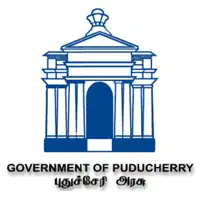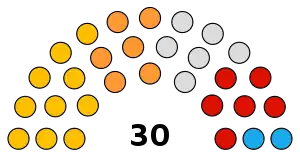Puducherry Legislative Assembly
The Puducherry Legislative Assembly (French: Assemblée législative de Pondichéry) is the unicameral legislature of the Indian union territory (UT) of Puducherry, which comprises four districts: Puducherry, Karaikal, Mahé and Yanam. Out of eight union territories of India, only three have legislatures and they are Delhi[note 1], Puducherry[note 2] and Jammu and Kashmir[note 3]. After delimitation shortly after its formation, the Puducherry legislative assembly has 33 seats, of which 5 are reserved for candidates from scheduled castes and 3 members are nominated by the Government of India. 30 out of 33 Members are elected directly by the people on the basis of universal adult franchise and the remaining three are nominated by the central government. These nominated members enjoy same powers as elected members of the assembly.

Puducherry Legislative Assembly Assemblée législative de Pondichéry | |
|---|---|
| 15th Puducherry Assembly | |
 | |
| Type | |
| Type | |
Term limits | 5 years |
| History | |
| Founded | 1 July 1963 |
| Preceded by | Puducherry Representative Assembly |
| Leadership | |
Leader of the House (Chief Minister) | |
| Structure | |
| Seats | 30 (elected) + 3 (nominated) |
 | |
Political groups | Government (25) NDA (25) Opposition (8) |
| Elections | |
| First-past-the-post | |
Last election | 6 April 2021 |
Next election | 2026 |
| Meeting place | |
 | |
| Puducherry Legislative Assembly | |
| Website | |
| https://puddu.neva.gov.in/ | |
Geographically, the area under the Puducherry UT consists of three disjointed regions, with Puducherry and Karaikal districts surrounded by districts of Tamil Nadu, Yanam district an enclave of East Godavari district of Andhra Pradesh, and Mahé district bordered by districts of Kerala. The four districts were ruled by French before they were integrated into India in 1962. For ease of administration, during French rule, the area under these four districts was divided into 39 assembly constituencies. After becoming a UT of India, Puducherry was divided into 30 assembly constituencies, which were restructured in 2005 by the Delimitation Commission of India.
History
Assembly during French rule
In 1946, French India (Inde française) became Overseas territory (Territoire d'outre-mer) of France. Then a Representative Assembly (Assemblée représentative) was created. Thus, in 1946, on 25 October, the representative assembly of 44 members has replaced the general council (conseil général).[4] The Representative Assembly had 44 seats until merger of Chandernagore in 1951. Later, it reduced to 39 seats.
Merger and formation of Union Territory
The French government transferred the four enclaves to the Indian Union under a de facto treaty on 1 November 1954.[5] Later the territory was merged with India on 16 August 1962.
On 10 May 1963, the Indian Parliament enacted the Government of Union Territories Act, 1963 that came into force on 1 July 1963. This introduced the same pattern of government that prevailed in the rest of the country, but subject to certain limitations.[6] Under Article 239 of the Indian Constitution, the President of India appoints an Administrator LG with such designation as he may specify to head the administration of the territory. The President also appoints the Chief Minister. The President, on the advice of the Chief Minister, appoints the other Ministers. The Union Territories Act, 1963 limits the number of elected members of the assembly to 30 and allows the central government to appoint not more than 3 nominated MLAs. The same act ensures that seats are reserved for Scheduled Castes in the legislative assembly.
The Representative Assembly was converted into the Legislative Assembly of Pondicherry on 1 July 1963 as per Section 54(3) of The Union Territories Act, 1963[6] and its members were deemed to have been elected to the Assembly.[7]: 966 Thus, the First Legislative Assembly was formed without an election. Elections for the assembly have been held since 1964.
Nominated MLAs
Very few state/U.T. legislative assemblies have nominated MLAs and their voting powers are limited with Puducherry being the only exception. In 2021, the Supreme Court of India has clarified two important aspects related to the nominated MLAs.[note 4]. The first one is about their nomination. The court held that as per the 1963 act the central government is empowered to nominate the MLAs even without consulting the Government of Puducherry. The second one is about the power of vote of the nominated MLAs.[9] The court also held that the nominated MLAs enjoys voting powers at par with elected MLAs as the 1963 law per se did not differentiate between the nominated MLAs from the elected ones.[10]
Location
The current Legislative Assembly is located in the rue Victor Simonel in a colonial-era building that was originally a medical college. The college was relocated to another location and since 1969 the building has been used for the assembly.
Tenures of different legislative assemblies of Puducherry
Source:[7]: 967
| Election Year | Assembly | Period | Ruling Party | |
|---|---|---|---|---|
| 1963 | 1st Assembly | 1 July 1963 - 24 August 1964 | Indian National Congress | |
| 1964 | 2nd Assembly | 29 August 1964 - 18 September 1968 | Indian National Congress | |
| 1969 | 3rd Assembly | 17 March 1969 - 3 January 1974 | Dravida Munnetra Kazhagam | |
| 1974 | 4th Assembly | 6 March 1974 - 28 March 1974 | All India Anna Dravida Munnetra Kazhagam | |
| 1977 | 5th Assembly | 2 July 1977 - 12 November 1978 | All India Anna Dravida Munnetra Kazhagam | |
| 1980 | 6th Assembly | 16 January 1980 - 24 June 1983 | Dravida Munnetra Kazhagam | |
| 1985 | 7th Assembly | 16 March 1985 - 5 March 1990 | Indian National Congress | |
| 1990 | 8th Assembly | 5 March 1990 - 4 March 1991 | Dravida Munnetra Kazhagam | |
| 1991 | 9th Assembly | 4 July 1991 - 14 May 1996 | Indian National Congress | |
| 1996 | 10th Assembly | 10 July 1996 - 21 March 2000 | Dravida Munnetra Kazhagam | |
| 22 March 2000 - 16 May 2001 | Indian National Congress | |||
| 2001 | 11th Assembly | 16 May 2001 - 2006 | Indian National Congress | |
| 2006 | 12th Assembly | 2006 - 2011 | Indian National Congress | |
| 2011 | 13th Assembly | 2011 - 2016 | All India N.R. Congress | |
| 2016 | 14th Assembly | 2016 - 22 February 2021[11] | Indian National Congress | |
| 2021 | 15th Assembly | 16 June 2021[12] - Till date | All India N.R. Congress | |
Membership by party
Members of Puducherry assembly by their political party (As on 24.06.2022) :
| Alliance | Party | MLAs | Leader of the legislature party | ||
|---|---|---|---|---|---|
| NDA (25) | AINRC | 10 | N. Rangasamy[13] | ||
| BJP | 6 | Namassivayam[14] | |||
| IND | 6 | ||||
| NOM | 3[15] | ||||
| UPA (8) | DMK | 6 | R. Siva[16] | ||
| INC | 2 | ||||
Members of Legislative Assembly
See also
- List of constituencies of Puducherry Legislative Assembly
- List of chief ministers of Puducherry
- List of leaders of the opposition in the Puducherry Legislative Assembly
- List of lieutenant governors of Puducherry
- List of speakers of the Puducherry Legislative Assembly
- Puducherry (Lok Sabha constituency)
- List of Rajya Sabha members from Puducherry
- Puducherry Municipal Council
- Yanam Municipal Council
Notes
- Assembly existed between 1952 and 1956 and exist ever since 1993.[2]
- Assembly exist since 1962.
- Assembly created in 2019.[3]
- This judgement sealed the fate of sealed the fate of Narayasamy's government during the 14th Puducherry Assembly and he lost the trust vote as the nominated MLAs voted against him. With resignations of 6 MLAs (five from Congress and one from DMK), from 33 the house strength dwindled to 26. The Narayansamy-led UPA government consisting of Congress (9 with speaker), DMK (2) and an independent (1), had strength 12. The opposition strength 14 MLAs which consisted of AINRC (7), AIADMK (4) and the three nominated members affiliated to BJP. As per the judgement, counting the strength of nominated MLAs, the opposition outnumbered the government in strength and the government fell out subsequently and the president rule was imposed.[8]
References
- "Is the BJP trying to capture power from its ally AINRC in Puducherry?". Scroll.in. 14 May 2021. Retrieved 8 June 2022.
- The Constitution (Sixty-ninth Amendment) Act, 1991
- "Jammu and Kashmir assembly election in 2021 after delimitation: EC sources". Zee News. 29 August 2019. Retrieved 30 June 2022.
- Les établissements français en Inde au XIXe siècle, 1816–1914 (4). 1988. ISBN 9782402119122.
{{cite book}}:|work=ignored (help) - "Treaty establishing De Jure Cession of French Establishments in India". Ministry of External Affairs. Media Center (Government of India). 1956.
- "The Government of Union Territories Act, 1963" (PDF). Ministry of Home Affairs, Government of India. Retrieved 8 June 2020.
- Cabinet Responsibility to Legislature. 1964. p. 464. ISBN 9788120004009.
{{cite book}}:|work=ignored (help) - Nair, Rajesh B (22 February 2021). "Puducherry CM resigns; Speaker rules trust vote defeated". The Hindu. Retrieved 26 June 2022.
- Datta, Prabhash K (22 February 2021). "How BJP's nominated MLAs sealed Congress's fate in Puducherry". India Today. Retrieved 26 June 2022.
- Roy, Chakshu (24 February 2021). "Explained: The trust vote in Puducherry". The Indian Express. Retrieved 26 June 2022.
- Bosco Dominique, ed. (22 February 2021). "Congress govt in Puducherry fails to prove majority in assembly; CM Narayanasamy and colleagues resign". The Times of India. Retrieved 28 June 2022.
- "Puducherry Assembly to convene on June 16 for Speaker election". The New Indian Express. 12 June 2021. Retrieved 2 July 2022.
- "Rangasamy elected AINRC Legislature Party Leader in Puducherry". NetIndian. 15 May 2021. Retrieved 26 June 2022.
- "A Namassivayam elected floor leader of BJP in Puducherry Assembly". Asian News International. 7 May 2021. Retrieved 26 June 2022.
- "BJP grows stronger in Puducherry as 3 party men nominated as MLAs". The Deccan Herald. 11 May 2021. Retrieved 28 June 2022.
- "Four-time MLA R Siva appointed leader of DMK legislature party in Puducherry". The New Indian Express. 8 May 2021. Retrieved 26 June 2022.